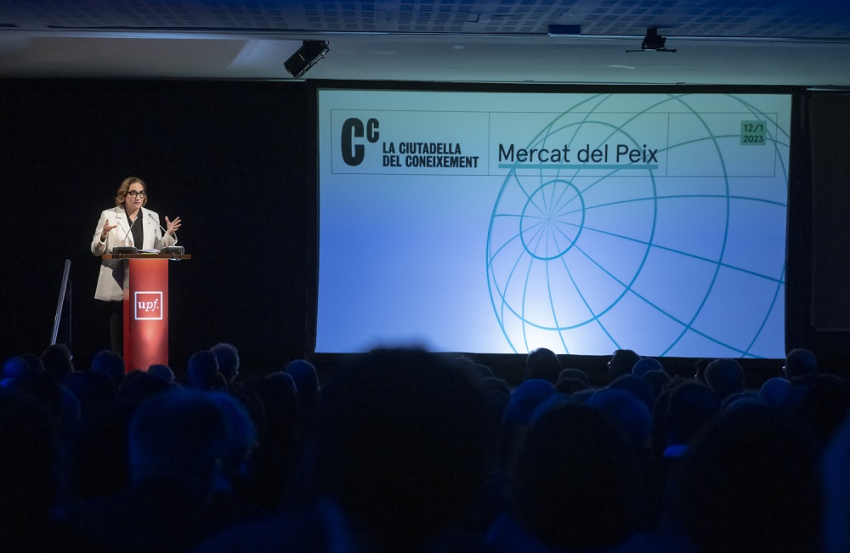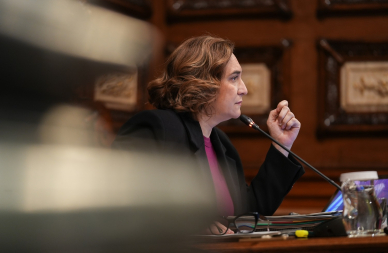24/02/2023
Get to know the Mayor better
Signing of the Ciutadella of Knowledge protocol
Share it
Speech of the day 11/01/2023

"Barcelona is strengthening its economic commitment to innovation, technology and knowledge, the best possible economic driver for making the future the present."
How happy I am to be here today. Just now the former rector of the UPF, Jaume Casals, and I recalled how it was in 2019 when we first signed, prompted by Pompeu Fabra University and the City Council, totally convinced and in full agreement, in very turbulent times when it seemed difficult to do things. But we had no doubt that the project had to go ahead.
There too, needless to say, was Andreu Mas-Colell, a vital figure in the scientific ecosystem and this project. And also there was Joan Subirats, today a [Spanish government] minister, then deputy mayor, for Culture, Education and Science.
Those of us who were present back then, including the Catalan Ministry for Business, remember it was a much smaller event than this one but with all the ambition and all the vision that is being transmitted today.
What a joy that from that beginning and overcoming turbulent times, we've managed to keep going and now we can celebrate the start of work on the Fish Market. Work that involves three new buildings occupying 45,000 square metres and 1,200 researchers.
Moreover in key areas: biomedicine, biodiversity and planetary well-being. Areas of the future, which is what we are interested in.
We should also mention this is merely the start, it isn’t an isolated project. Added to that is recovery of the park’s facilities and heritage: The Hivernacle (greenhouse), already under way, the Martorell Museum, Three Dragons, the new CSIC centre, the new França Station library and the new direction of the Zoo.
In short, a scientific, cultural and urban development initiative that will turn the park and its surroundings into a benchmark knowledge and research hub in southern Europe.
We’re talking about some 2,000 researchers and an investment of €200 million.
Moreover, it’s not just the Fish Market and the Park, but also the scientific and innovation ecosystem that goes back a long way and that is a benchmark: for example, the Supercomputing Center, projects that are under way such as the Caixa Research Institute, and, of course, the everyday work of our universities and research centres, who are here today.
This city council has given a significant boost to the importance of science in the city.
You know they usually tell us that this isn’t a specific local competence but we’ve always been clear in Barcelona that science was a principal strategy for making the fairer, more democratic and more sustainable city that we want to be.
And we’ve done that with a renewed impetus in recent years. Initiatives have been taken in the past, but the previous deputy mayor and now minister, Joan Subirats, and the current deputy mayor, Jordi Martí, who has taken over from him, have given continuity to this 2020-2023 Barcelona Science Plan, the City and Science Biennial, or by promoting this project, the Ciutadella of Knowledge.
As I was saying, I’d like to stress that we aren’t talking about an isolated project but a city project. I believe that is an absolutely key element. It is a city project that obviously has an urban development component, as already explained by Deputy Mayor Janet Sanz, who has been working on promoting this project all this time. But I'd like to stress it is also a project that has a vision of economic projection, of the future, as well as the international projection of Barcelona.
I believe we’ve come from previous decades when, unfortunately, the neoliberalism that today endangers life on the planet and which we have to change, because it is unsustainable, had left us in the hands of property speculation or a tourist monoculture. And that is not the model which Barcelona needs.
Because, clearly, it is not a model for the future. Therefore, when we took over at the City Council, we quickly exercised the kind of public leadership that perhaps had not been exercised in previous terms of office. And we decided we didn’t want to be in the hands of speculators, that we have talent, we have culture, science, a groundbreaking university ecosystem which is a benchmark for the world. And that we should take those strengths and put them at the forefront of the economy and the city’s international projection.
That's why in recent years we have speeded up this commitment to innovation, technology, research, industry and the economic diversification that the city needed.
Something which is reflected in the period of expansion and international projection that Barcelona is experiencing.
These processes of transformation and innovation have been accompanied by many international recognitions and also by attracting events that are important for the city in various fields.
There are more and more examples: the America’s Cup, Capital of Architecture in 2026, the Manifesta contemporary art festival, the fact that the MWC, a benchmark congress, has decided Barcelona will be its permanent home, that leading companies such as Wallbox and Microsoft, in fact, 70% of new tech companies throughout Spain, are based in the city of Barcelona. And all this with falling unemployment, with record figures for the last 15 years, and at the same time, with the highest level of investment in the social sphere compared to any other large city in Spain.
So, there’s a model and a strategy. That greatly strengthens the project and gives us confidence that this project cannot be stopped because it is part of a determined city strategy that aims to consolidate Barcelona as the undisputed science and research capital of Spain and southern Europe.
Barcelona is strengthening its economic commitment to innovation, technology and knowledge, the best possible economic driver for making the future the present.
So on behalf of Barcelona City Council I would like to thank all the people and actors involved, research institutes, universities, administrations that have joined us.
We have the President of the Generalitat and two Spanish Government ministers here today which we are thrilled about.
I hope this project becomes a benchmark project in the city, the country and the world. Because I really believe it has all the elements for becoming an exemplary project. How good that would be, for its content but also for its capacity to build, which is something we need a great deal at present.
And let me finish by saying that this project is an example of joining forces and coordination between institutions, but also of public leadership and enterprising institutions, as Mazzucato would say, with a long-term vision, which we also need very much.
We live in turbulent times with many emergencies, but this should not prevent us from looking to the medium and long term.
If the administrations only look to the immediate, we will surely be making a mistake, because we are living at a time of systemic crisis, a paradigm shift. As Gramsci used to say, we are at that moment when the new world is being born and the old world has not yet died, the time of monsters. The monsters of Trumpism, the extreme right, climate deniers... So this is the time when our vision has to be clearer than ever.
And Barcelona is very clear. Barcelona wants to lead the future, it wants to lead the utopia not the dystopia, and that’s why Barcelona, honouring its best tradition, will be a courageous and innovative city which, based on cooperation and networking will lead a better future for our children.
Many thanks.

